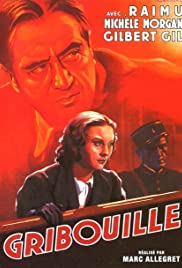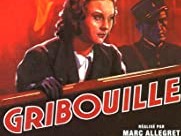Gribouille [Heart of Paris] **** (1937, Raimu, Michèle Morgan, Gilbert Gil, Jeanne Provost, Julien Carette, Jean Worms, Andrex) – Classic Movie Review 10,925
Marc Allégret’s 1937 film Gribouille [Heart of Paris] is a minor classic from the French golden age, with Raimu starring as Camille Morestan, the juror who takes pity on a woe-begone innocent acquitted of murder.
Gribouille is dour in tone, though billed as a comedy and a romance as well as a drama, but the acting lights up the screen. The extravagant character star Raimu is agreeably kept within bounds by director Allégret, while Jeanne Provost is tremendous as Camille’s funny and smart wife Louise Morestan. Especially notable is the memorable star début by Michèle Morgan (after half a dozen small roles) as Natalie, who stands trial after she has accidentally killed her lover, a rich boy whose death his father wants to avenge.
But Camille helps save the defendant and makes the other members of the jury change their minds after new evidence is found. When Natalie is released, she cannot find a job but Camille, who owns a cycle shop, hires her, and Camille’s son Claude Morestan (Gilbert Gil) falls for her.
It is based on Marcel Achard’s story Gribouille, with adaptation by Jan Lustig [H G Lustig] and dialogue by Marcel Achard.
Also in the cast are Gilbert Gil, Jean Worms, Julien Carette, Jeanne Provost, Jacques Gretillat, Marcel André, Jacques Baumer, Andrex, René Bergeron, Jenny Carol, André Siméon, Jean Worms, Nicolas Rimsky, Jacqueline Pacaud, and Pauline Carton.
It was remade in Hollywood as The Lady In Question (1940).
Gribouille translates as a ‘naive person who stupidly throws herself into the troubles she wanted to avoid’. Or just ‘doodle’, ‘scribble’, or ‘scrawl’.
Orson Welles bizarrely called Raimu (born Jules Auguste Cesar Muraire) ‘the greatest actor who ever lived’.
Gribouille [Heart of Paris] runs 86 minutes, is made by Productions André Daven and L’Alliance Cinématographique Européenne (ACE), is released by Gray-Film (1937) (France) and Tri-National Films (1939) (US), is written by Jan Lustig [H G Lustig] (adaptation) and Marcel Achard (dialogue), based on Marcel Achard’s story Gribouille, is shot in black and white by Georges Benoît, Armand Thirard and Michel Kelber, is produced by André Daven, is scored by Georges Auric and is designed by Alexandre Trauner.
© Derek Winnert 2021 Classic Movie Review 10,925
Check out more reviews on http://derekwinnert.com



